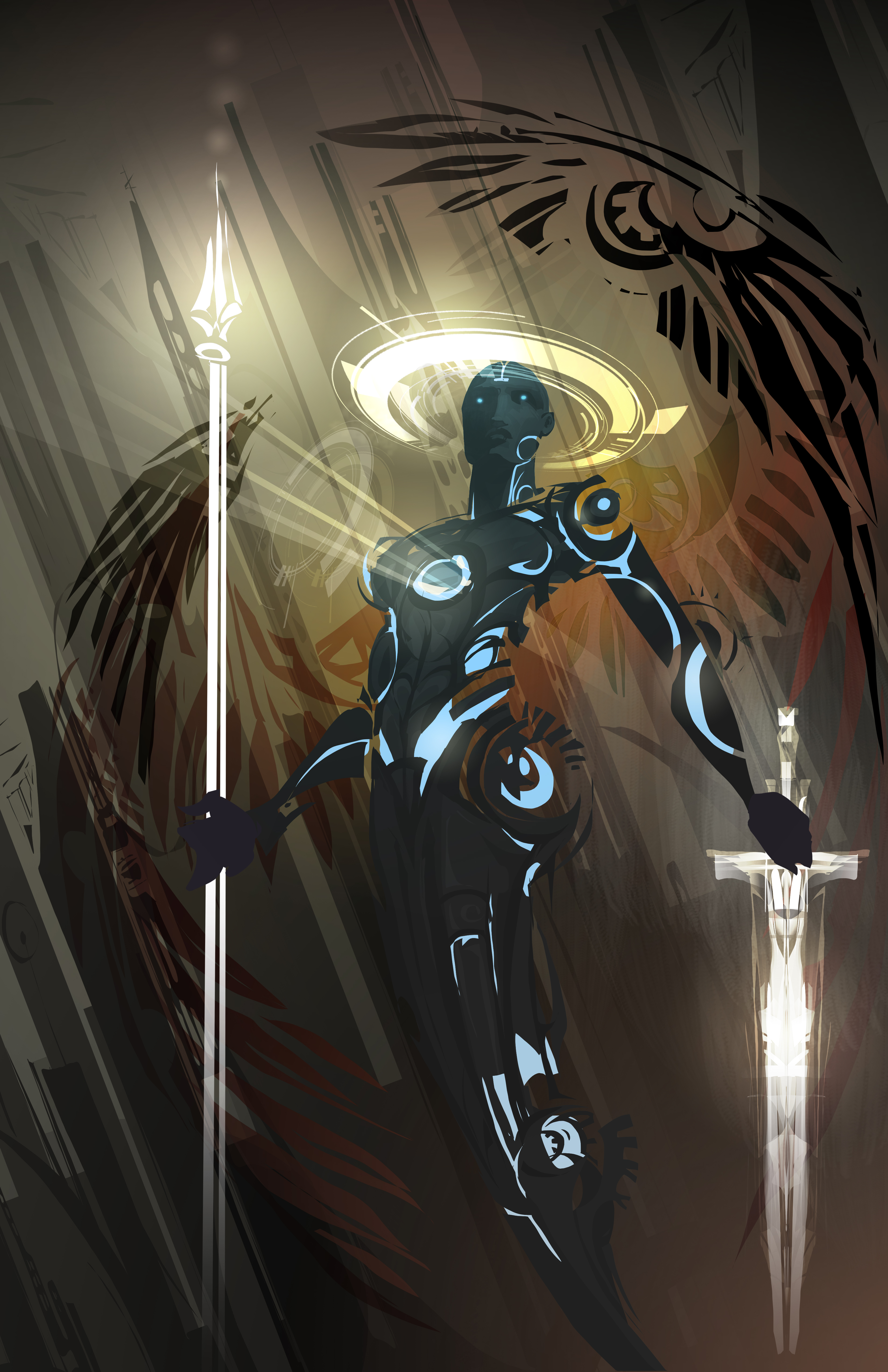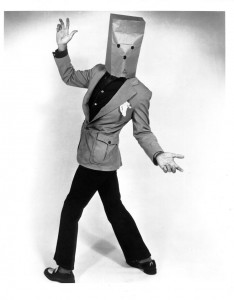written by Frank Dutkiewicz
I have been looking forward to this month for a very long time. Why? Read onâ€
The protagonist teaches his daughter on the realities of genie-powered electricity in “Genie Electric” by Andrew Kaye (debut 3/1 and reviewed by Frank D). A light bulb has burned out. The genie who powered it, died. This makes the protagonist’s daughter sad but genies are what makes the world go around.
“Genie Electric” is a parallel world where genies are electrically charged beings. A history lesson using the same names who discovered how to harness electricity in our world, as the masters who learned how to harness the magical being’s power. The little girl in this tale becomes regretful that we have used others as slaves to improve our own welfare.
The story is cuter than my harsh synopsis. For a flash story, I found it to be very clever. Well worth a read.
“The Sacred Tree” by Mike Resnick (debut 3/2 and reviewed by James Hanzelka) is a story of the Yakima. They are a Northwestern tribe and are threatened by the white man, who has come to claim their land, their women and their souls. When the Indian agent threatens to conscript members of the tribe as scouts, killing two men in the process, the tribe seeks help from the spirits. The medicine man asks for help from the sacred tree, his wish is granted, but at what cost?
I loved this story, but that may be because I grew up in the west and went to school at a university that has a Native American tradition. The lore of the indigenous peoples is strong in the west and this story captures that essence beautifully. The author also manages to drive the tale forward to today, and shows us that powerful gifts often require great sacrifice. I recommend this story to everyone who wants to understand this culture.
“The Way” by Frank Dutkiewicz (debut 3/2 and reviewed by James Hanzelka). John and Helen are old and feel they are becoming a burden to their children. They set out on one last adventure, one last memory before all the memories fade. One more spin around the block before life winds down. What they find is themselves and the joy they once knew.
This is a well written tale of life and love. It wraps the reader in the lives of these two people, nearing the end of their journey. While the tale is about John and Helen, most of us will see ourselves in their story. The author has done a superb job of weaving hope and joy into that last stage of life. I can recommend this story to anyone who wants to feel that for themselves.
“Painted Haven” by Michael Banker (debut 3/6 and reviewed by Frank D). Light is taking over. Not sunlight but brightness with substances. The strange stuff frightens Alyssa. She runs to her old boyfriend; confident Henry will know what to do. She finds him painting his apartment, a last ditch solution to keep the light at bay.
“Painted Haven” is one of those rare short stories that had me on the edge of my seat in the first paragraph. The strange light that falls like snow had me completely intrigued. I had hoped Henry would have some sort of answer but the guy turned out to be a flake. The promising and intriguing premise quickly became something I hadn’t bargained for when I first dove in. Although the story took a path I’d rather not gone down, a touching moment of the once couple reminiscing, painting scenes of there life together while they cover the walls to keep the unknown at bay.
Although the second half of this tale didn’t turn out the way I hoped, “Painted Haven” still was a nice story. I’m betting more than a few were glad it traveled in the direction the author took it.
A man makes it his life long quest to discover “How Love Works” by Stephen Gaskell (debut 3/7 and reviewed by Frank D). The protagonist in this tale suffers a broken heart from his first teenage love and spends the rest of his life recovering from it.
The story is part of the numbers quartet, using Planck’s Constant as its trigger. The lad in this tale lives a full life, full enough to make me envious. The tale thinly links to the trigger.
In “Prophet” by Laura Lee McArdle (debut 3/8 and reviewed by Anonymous), a precocious 4 year old is conversing with God about his decision to make a rather unimaginative and orderly woman a pre-school teacher. It is an interesting conversation and is well-written and nicely paced, and, of course, you’d imagine God has all the answers..
Let’s just say God provides the raw materials…
I enjoyed this short story and would give it a 5 and half rocket dragons (out of seven).
The main character in “Insomnia” by A.G. Carpenter (debut 3/9 and reviewed by James Hanzelka) is an assassin, but the good kind. His job is to eliminate people who will cause problems for mankind in the future. The side effect is a never-ending parade of hallucinations and endless insomnia. When he is tasked to kill the witness of his latest hit he can no longer stand the strain and saves her. After all, he wonders, how much damage can one person do.
This is a nice story, well setup and neatly plotted. The writing is crisp and clear. There is enough of a twist in the vaguely familiar tale to keep you interested. I also liked the slightly noir overtone in the story. A nice read for a little daily diversion.
“The Take” by Alex Shvartsman (debut 3/12 and reviewed by James Hanzelka).
Ever wonder what happens to actors when new technology replaces older forms of entertainment? Like those silent stars that lost their jobs when talking pictures came into being, plays and movies become extinct when real life experiences become possible to experience? What will those involved in the more traditional theater have to give up to stay employed?
The story here is one of confused reality occasioned by new technology. The author has done a fairly good job of giving us some insight to those left behind as science advances. The theme has been handled by better by others, but this is a good effort. It is well written and works on a basic level.
A patient is being given some terminal news in “Mortal Coil” by Ian Nichols (debut 3/13 and reviewed by Anonymous). This story is told from the perspective of the doctor. Apparently the patient suffers from a syndrome that causes him to reject some of the technology floating in his bloodstream–tech that keeps living. The doc has to give him the bad news…
A nicely written flash story with a simple twist at the end. I quite enjoyed it and the medical elements were well done. Five out of seven rocket dragons.
Space and time separate Vu and Loi. The distance between the two siblings is as great as their link is strong in “The Heartless Light of Stars” by Aliette de Bodard (debut 3/14 and reviewed by Frank D).
Loi was the eldest of his Vietnamese family, keeper of the ancestral shrine. Despite the eight year distance in time, Vu eagerly awaits Loi’s video messages. An ansible station has immediate information but such equipment is out of the reach of ordinary citizens. Vu instead must wait for eight year news, even when he is aware of the eventual outcome in Loi’s destiny.
“Heartless” focuses on the family structure of this sibling pair but the real draw of this tale is the eight year day-to-day information Vu receives even when he knows of his brother’s fate. When the gravity of the story is revealed, the reality of what Vu is putting himself through, turns the story into a voice from the past instead of a letter from overseas experience. The subtleness of Ms Bodard’s ability to spring a twist sets her apart from many other writers. A pity the twist made the backstory almost irrelevant, but then again, that may be why the twist works so well.
“The Body Shop” by Devin Wallace (debut 3/15 and reviewed by Frank D). James needs to buy his daughter something important. Body shops need to turn a profit, however. Fortunately, James has just what they need for him to complete a trade.
“The Body Shop” is set in a future where pawn shops we’ll deal with anything. James is a parent who proves he is willing to do anything for his angel. The most impressive thing about this tale was the author is still in high school. I see big things in young Mr Wallace’s future.
A girl sacrifices truth to satisfy her vanity in “No Gifts of Words” by Annie Bellet (debut 3/16 and reviewed by Frank D). Afua is ugly. She wishes to be beautiful so attempts a foolhardy theft of a witches’ potion. The witch catches her in the act and condemns her to a life of lies.
“No Gifts” is the tale of a girl living with the consequences of her actions. Afua had hoped to be free from the torment of being different. The potion granted her beauty but a curse of never being able to tell the truth had left her friendless. Her life takes a twist when a handsome king stops near the field in which she works. She declares herself a queen of the lemurs to him. The lie amuses the king. A few days later, a lemur appears. The creature becomes mesmerized by Afua as she tells her lies of amusement to him.
I found this story attractive. Although it drifted, and the twist was predictable, I couldn’t help but to be drawn into this curious tale. A well-written fable.
“Memories of My Mother” by Ken Liu (debut 3/18 and reviewed by Frank D). Amy’s mother is dying. She has only a couple years to live but thanks to the miracle of light speed space travel, she can see her daughter grow up.
“Memories” is a collection of short visits Amy has with her mother. Once every seven years, Mom returns for a day. Catching up on seven years in one day is no way to carry out a relationship. Amy is left confused with each visit, caught between resentment and gratitude for a mother she sees briefly.
I can’t imagine a woman, even a dying one, would leave after spending a day with a child , or rebellious teenager. It would feel like abandonment to me and I can’t see how anyone else wouldn’t see it the same way. Original idea, would have been better if lengthened and the premise hashed out in greater detail.
“Guaranteed to Work” by Lee Hallison (debut 3/20 and reviewed by Frank D). The magic has gone out of Ruth and Frank’s marriage. Retirement has not turned out as Ruth had envisioned it. Instead of traveling and enjoying the last years of their life, Frank has become crotchety and distant. Resentment builds for her. A kindly old man at the coffee shop has a solution to her problem; a love potion. A powder that make them forget all the petty annoyances that has become their life.
“Guaranteed” is a fantasy story that is frighteningly close to reality. The everyday irritations that bugs Ruth about her husband has crescendo to a constant nails-on-chalkboard nuisance. You can see her feelings toward Frank has become something closer to hate than love. Ruth’s godfather offers her a chance to bring back the love they had in their youth. The choice sounds like a no-brainer until Ruth analyzes what ‘change’ really means.
I confess, I reread the ending several times and I’m still not sure exactly what happened. Although I felt unsatisfied with the conclusion I must say this tale was more of an eye opener than most I’ve read before. Ms Hallison deserves a lot of credit for making a fantasy story read a lot more real than the majority of non-speculative stuff I’ve read before. Well done.
“Godshift” by Nancy Fulda (debut 3/21 and reviewed by Carl Slaughter) has something for everyone.
Science discovery: “Ladies and gentlemen, we have just provided experimental validation for string theory.”
Hard science: “String theory predicted that space-time encompassed ten or more dimensions, most of them curled up so tightly as to be unobservable. Even the Large Hadron Collider was unable to generate enough energy to perceive them. Ilyona had first suggested using M-brane topologies to uncurl localized segments of higher-order dimensions.”
Mysterious, global phenomenon: “Over the past three days, there have been 165 cases of criminals brought to justice by natural forcesâ€And all of them, every last one, occurred during one of our five-minute luminosity peaks”
Science debate: “Give up the search for the extra dimensions predicted by string theory, just because a series of absurdities occurred while we were accelerating particles?… Co-occurrence does not imply causality.”
Famous science device: “Large Hadron Collider, world’s largest and highest energy particle accelerator.”
Fundamental science concepts challenged: “All of the results agree with each other if we assume a change in the generally accepted physical constants.” “Physical constants don’t change. That’s why they’re constants.” “Well, yesterday, they did. For exactly five minutes, the gravitational constant decreased by 0.003 Ã�’- 10âË�’11. The speed of light increased by 512 meters per second. And the weak nuclear force appears to have fluctuated, as well.”
Science premise: “If one supposed that God existed within the fabric of the Universe–was the Universe, for lack of a better description–and if one used the Large Hadron Collider to alter the physical constants that governed the Universe…Then one must, of necessity, have also altered the nature of God.”
Religious-philosophical debate: “Because if you’d ever believed in Him–really believed–you’d have asked yourself, eventually, why He allows horrible things to happen in this world. You’d have asked yourself how God can let children suffer; why He doesn’t come down and do something about it.” “Well, according to every religious nut on a soap box, He did something about it today.”
Office romance, his version: “He probably should not have slept with her. They always got arrogant afterwards. But he had such a weakness for students who were so obviously dazzled by his brilliance.”
Office romance, her version: “It wasn’t smart to snap at your thesis advisor. Especially not when you were sleeping with him to make sure your name actually ended up on the research papers.”
In the midst of all the discussion about data and debate about implications, God manifests. How’s that for an ambitious plot device.
“Godshift” is about the age old struggle between a scientist and a religionist. Both are true believers. Despite ensuring that his name will be a household word for the rest of the history of the human race, the scientist isn’t satisfied. He wants to keep pushing buttons. The religionist cannot accept tampering with God and intervenes to stop the scientist from pushing any more buttons. Judging from the ending, the religionist will probably prevail. Ah, but in the interval, the scientist has enough time to push plenty more buttons.
The presentation is mostly pedestrian, but Fulda ‘s flare that we saw in her two Nebula stories – “Flashback” and “Movement” – peeks through in a few places: “The feeling was back again, a vague sense of wrongness that had permeated each of their research runs over the past three days. It was a fleeting, tentative thing, hard to put your finger on; like walking into a familiar room and finding all the furniture moved one inch to the rightâ€And it was back again: the sense of wrongness, as if all the light in the room suddenly came from a different direction.”
This story is part of a series by 4 established authors who refer to themselves as the Numbers Quartet. Every story is based on a dozen physical and mathematical constants – pi, zero, speed of light, etc. In this case, infinity. The other three authors are Aliette de Bodard, Stephen Gaskell, and Benjamin Rosenbaum. All the stories are short pieces and were published in Daily Science Fiction between January 12 and March 28, 2012. The stories appeared in chronological sequence, with the oldest developed concept, pi, being first.
“The Fabulous Hotel” by Sandra McDonald (debut 3/22 and reviewed by Dustin Adams).
In a dystopian future, one man’s vision of a grand hotel is well received. Permission granted, he sinks deep, deeper than anyone should, into his plans. Abandoning everything but his vision, he draws, and draws, and draws.
I liked this story, but I’m not sure if it’s a commentary on never reaching perfection, or a straight tale of futility in a futile world. Read it, decide for yourself.
“Frog/Prince” by Melissa Mead (debut 3/23 and reviewed by Dustin Adams).
Normally when a princess kisses a frog, he springs into manly form, fully clothed and with a grasp of language that I’m still working to attain. Thanks to Melissa Mead, we get the perspective of a frog who is, well, a frog. Becoming a man was not on his short list of things to do today. (List provided by the author.)
At first he wrestles with having to become a prince, but later embraces it. After all, the princess – is a princess. Around 3/4 through is where this fairy tale really gets turned on its ear. What happens when a once-frog and a princess have… offspring?
I subtracted one rocket because I felt the ending could have had a little more punch, but the intent is solid, as is the story. Worth checking out.
You may want to pay attention to the pre-flight instructions “In The Unlikely Event” by Ferret Steinmetz (debut 3/26 and reviewed by Frank D). This tale is a futuristic look at the hazards of interstellar travel. The story is a friendly announcement from the friendly crew before your spaceship takes part in its decades long journey.
Mr Steinmetz’s inspiration for this humorous piece came to him while he listened to check list of horrible possibilities of air travel the stewardess cheerfully announced before his plane took off. Funny work of flash.
“A Different Rain” by Mari Ness (debut 3/27 and reviewed by James Hanzelka).
Mary had spent her life in space and was eager to enjoy her home planet. She wanted to experience everything, especially the rain. She had only seen it once before and when a sudden storm arose she had her chance. She ran to enjoy it, even if it was a different kind of rain.
This is a nice little tale about expectations. Those things we dream of are seldom what we expect when we finally get them. Sometimes they are better, but more often than not they are worse. Mary would find that fulfilling expectations is difficult. I found this story interesting enough, even if it was somewhat expected.
She found the dark cloak in her closet, buried in the bottom in “Underneath” by Amelia Beamer (debut 3/28 and reviewed by James Hanzelka) . Now she can go out in public and no one will see the self-loathing, the cloak will hide it. But this cloak has a life of its own and soon she can’t separate it from herself. Maybe if she can destroy it she can be herself again. Or can she?
This is either a tale of madness or magic. Maybe it’s both. The author makes an attempt to draw us into the world of the main character and she does a fairly good job, but in the end it fell short for me. The writing is solid enough, but perhaps the subject matter is too dark and conflicted. Maybe the madness too close to the surface to be fully engaging. Some will find this story to their liking, but I wasn’t one of them.
A spaceport employee is “Offering Solace” by Jamie Lackey (debut 3/29 and reviewed by Frank D) to travelers. Her solace is a liquid in a bowl. She offers passerby’s a free whiff. The aroma is unique to each customer. The protagonist feels unappreciated, for she pours herself into her work.
“Offering Solace” was a sweet story that had an unexpectedly dark ending. It left me not knowing how I should feel about it.
A Wizard’s loyalties are tested in “The White Raven’s Feather” by David D. Levine (debut 3/31 and reviewed by Frank D). Ibude is a prisoner. A wizard, spoil of a lost war, serves his master , the Karshan Warhalt Kraig. He works on a magical spell he and lost wife had been working on before his home, Ubini, had fallen. He is still a year away from completing his work but Kraig is becoming impatient. Ibude does the only thing he can do to aid his master, reveal the positions of enemy.
But the spell shows Karshan’s enemy and former ally, the Svaargelders, soldiers massing near a cliff. Ibude recognizes the spell the enemy is about to use and realizes his wife and partner in magic, Ejira, work.
“White Raven” is a gripping tale of a man forced to use his genius to aid a people who destroyed all he held dear. An agreement between Karshan and Svaargelder split the married pair. Ibude was told if he were to die or escape his wife would be immediately executed. It is his genius that has kept him alive. He is overjoyed when he learns that his wife is still alive. His plot to be reunited with her takes a turn when Svaargelder soldiers coalesce out of thin air and are within the walls of the city.
I found myself intrigued with this tale. The tension and anxiety Ibude experience’s is brought to life for the reader. He is a pacifist forced to abandon his principles. His belief that Ejira shares his morals is dashed deep in the story. What I really enjoyed was the path Mr Levine chose for a resolution to Ibude’s dilemma.
Good Sci-fi and fantasy use the wide open settings only those genres are capable of bringing to life, as a canvas of commentary of the people we are today. Great writers can do it so well you may not even notice the subtle metaphor they so artfully articulate.
Recommended.
Should the name say it all?
I recently turned an avid reader of all types of fiction onto DSF. He said (not first time I heard this) that he didn’t realize DSF published fantasy. He assumed the magazine published only science fiction. He has come to enjoy receiving their daily emails but his confusion brings to light an inherent problem Daily SF has.
Daily SF is one of the most inclusive speculative fiction markets in the industry, but you wouldn’t know that unless you actually took the time to view their library (or read more than a weeks worth of material). A lot of people won’t read science fiction. Too many place the genre in a Star Trek/Star Wars box. The fact of the matter is more lovers of speculative fiction gravitate to fantasy than science fiction, and horror (vampires, zombies, and the like) is quickly coming up the rear. DSF publishes all of this (and a lot more) but too many readers don’t know it.
So, is a name change in order? Would the magazine be more attractive to a wider audience if DSF became Daily Science Fiction and Fantasy? Maybeâ€.
 Have you seen Mr Anonymous? His whereabouts are unknown. I haven’t heard from him in a very long time and I am getting concerned. I would give you a description but my arrangement with him forbids me to do so. So I can’t tell you his height, age, race, hair color, if he has hair, where he lives, what hemisphere he resides in, what he drives, if he drives, his spouses description, his sexual preference, or what type of pet he has. I can’t even confirm his real gender. But, if you have seen, him, her, them (?), please let me know.
Have you seen Mr Anonymous? His whereabouts are unknown. I haven’t heard from him in a very long time and I am getting concerned. I would give you a description but my arrangement with him forbids me to do so. So I can’t tell you his height, age, race, hair color, if he has hair, where he lives, what hemisphere he resides in, what he drives, if he drives, his spouses description, his sexual preference, or what type of pet he has. I can’t even confirm his real gender. But, if you have seen, him, her, them (?), please let me know.





